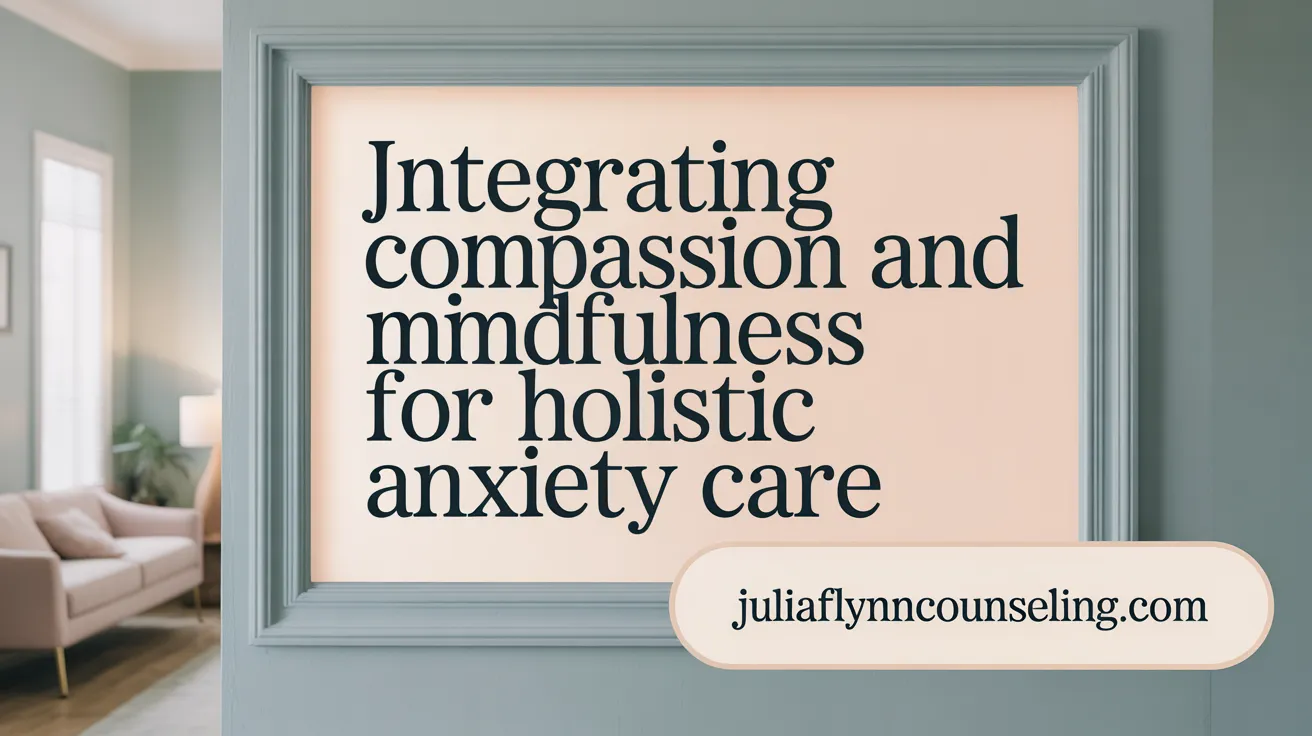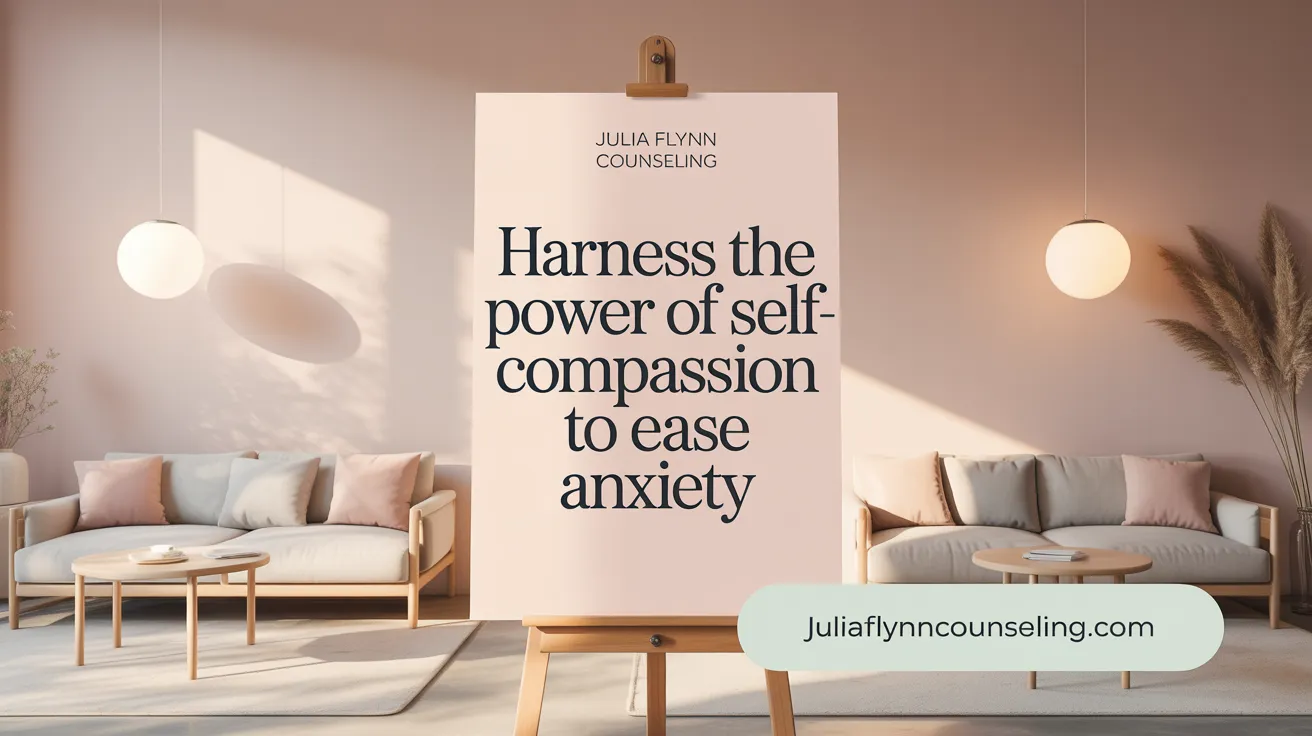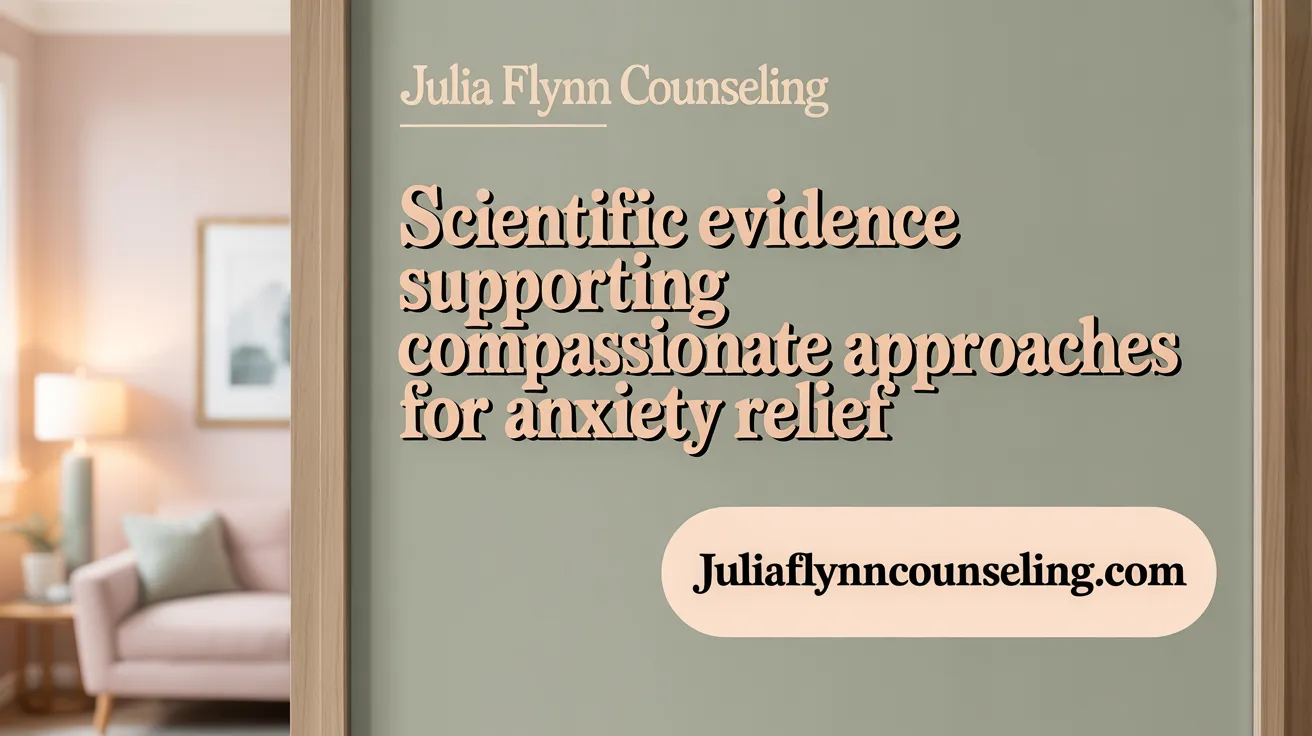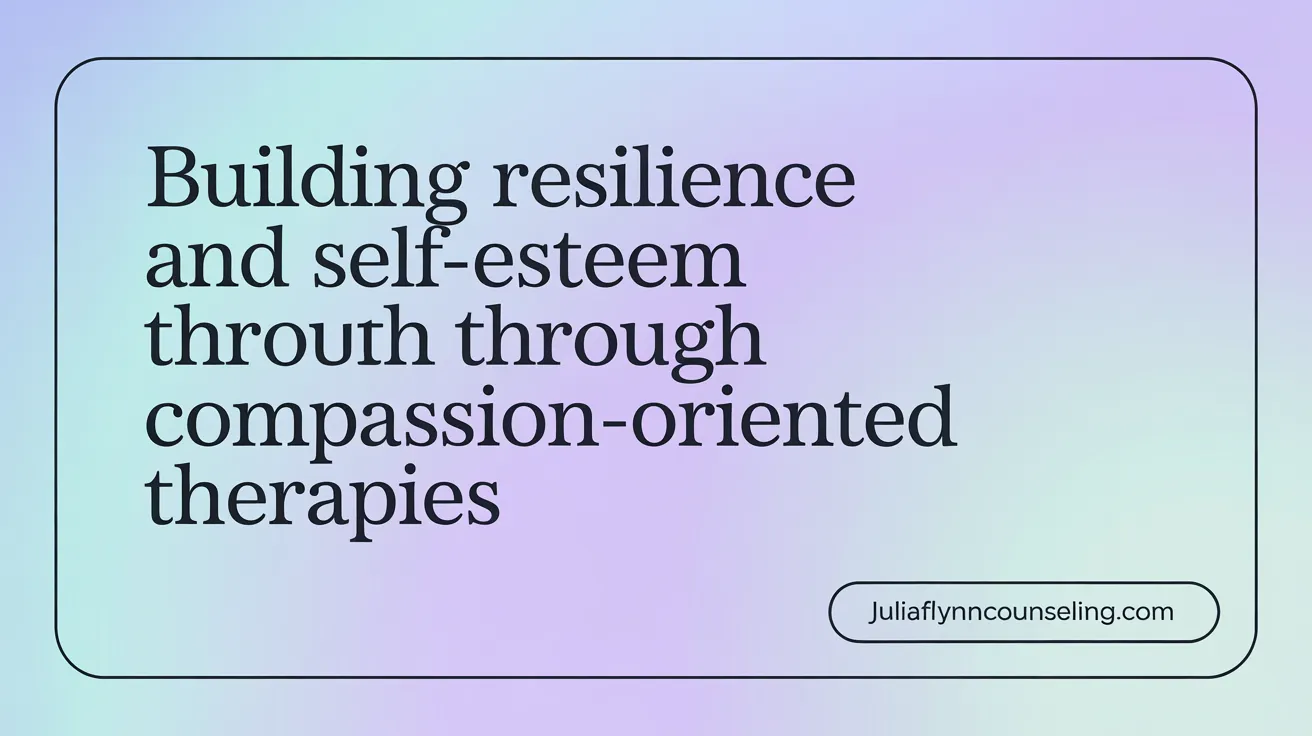Understanding Anxiety and the Promise of Compassionate Therapy
Anxiety disorders impact millions globally, manifesting not only in distressing thoughts but also in pervasive physical symptoms. While conventional therapies like cognitive-behavioral therapy have long been the treatment cornerstone, an emerging focus on compassionate and mindfulness-based approaches offers renewed hope. These therapies prioritize kindness to oneself and mindful presence, fostering resilience and emotional regulation. This article explores how compassionate therapeutic techniques, including Compassion-Focused Therapy and self-compassion practices, are reshaping anxiety management for lasting mental well-being.
What Are Anxiety Disorders? Symptoms, Causes, and Impact
What are anxiety disorders, and what are their common symptoms and causes?
Anxiety disorders are a collection of mental health conditions marked by chronic and often disproportionate feelings of worry, fear, or dread that encroach on everyday functioning.
They include types such as generalized anxiety disorder (GAD), panic disorder, social anxiety disorder, and specific phobias.
Individuals with anxiety disorders frequently experience both psychological symptoms—like panic attacks, obsessive thoughts, difficulty concentrating, irritability, and emotional restlessness—and physical manifestations such as rapid heartbeat, sweating, muscle tension, sleep disturbances, dizziness, and trembling.
Causes of anxiety disorders are multifaceted, involving a mixture of genetic predispositions, neurochemical imbalances (notably involving neurotransmitters like serotonin, norepinephrine, and GABA), and environmental factors such as traumatic life events, ongoing stress, and health issues.
The impact on daily life can be severe, leading to avoidance of situations, impaired work or academic performance, strained relationships, and overall reduction in quality of life.
Accurate diagnosis by mental health professionals facilitates effective treatment, which typically combines psychotherapy, particularly cognitive-behavioral therapy (CBT), and medication options like antidepressants. Lifestyle adjustments, including stress management and relaxation techniques, also contribute to improved management, helping individuals regain control and enhance their well-being.
Integrating Compassion and Mindfulness in Anxiety Treatment

What therapeutic approaches incorporate compassion and mindfulness to manage anxiety symptoms?
Therapeutic approaches that incorporate compassion and mindfulness to manage anxiety symptoms include Mindfulness-Based Stress Reduction (MBSR), Mindfulness-Based Cognitive Therapy (MBCT), Acceptance and Commitment Therapy (ACT), Compassion-Focused Therapy (CFT), and Attachment-based Compassion Therapy (ABCT). These interventions emphasize cultivating a nonjudgmental awareness of the present moment, fostering self-compassion, and promoting acceptance of thoughts and feelings.
Research demonstrates that such therapies can significantly reduce anxiety levels. They often outperform or match the effectiveness of traditional cognitive-behavioral therapy (CBT), with the additional benefit of enhancing emotional regulation and compassion towards oneself and others. Mindfulness practices involve meditation, body scans, yoga, and mindful attention in everyday activities, which help individuals become less reactive to internal distress and more reflective.
CFT, for example, addresses shame and self-criticism by developing compassionate inner dialogue, activating the soothing affect regulation system. ACT encourages acceptance and psychological flexibility, enabling individuals to experience anxiety without avoiding or suppressing it. MBCT combines mindfulness with cognitive therapy techniques to prevent relapse in high-risk groups.
The mechanisms underlying these therapies involve reducing physiological arousal, decreasing emotional reactivity, and fostering compassionate self-attitudes. These approaches also tend to be safe, well-tolerated, and accessible through group settings, individual therapy, or internet-based programs, making them suitable for diverse populations.
Overall, integrating compassion and mindfulness into anxiety treatment offers a holistic, effective, and adaptable path to alleviating psychological distress, improving well-being, and fostering resilience beyond what traditional approaches might achieve.
The Role of Self-Compassion in Managing Anxiety

What role does self-compassion play in managing anxiety?
Self-compassion is a vital element in effectively managing anxiety by promoting a gentle and understanding attitude toward oneself, especially during challenging moments. It comprises three core components: self-kindness rather than self-judgment, a sense of shared humanity instead of isolation, and mindfulness—an open, balanced awareness of one’s feelings without over-identification.
Practicing self-compassion helps interrupt cycles of self-criticism and worry that often amplify anxious feelings. By treating oneself with kindness and patience, individuals can accept their emotions without judgment, which reduces emotional distress and fear of failure. This compassionate approach creates a supportive inner environment that fosters emotional resilience.
Research evidence strongly links higher levels of self-compassion with lower symptoms of anxiety and depression. Interventions such as mindful self-compassion exercises, supportive self-talk, and compassionate imagery have demonstrated significant reductions in anxiety, often lasting for months after treatment. These practices enhance emotional regulation, allowing individuals to process stressors calmly and recover more swiftly from stressful events (Self-compassion interventions and anxiety reduction, Self-compassion and anxiety).
To cultivate self-compassion, individuals can incorporate simple daily practices: engaging in mindful meditation focusing on self-kindness, writing compassionate letters to oneself, or using affirmations that reinforce worth and patience (Self-compassion interventions and anxiety reduction, Self-compassion for anxiety reduction). Therapies like Internal Family Systems (IFS) also promote understanding and healing internal parts critical of oneself, fostering compassion.
The emotional benefits of self-compassion include increased resilience and the ability to face anxiety-provoking situations with a balanced perspective. It reduces fear of failure and shame, empowering individuals to approach life’s challenges with greater confidence and calmness (Why self-compassion is essential for mental health, Compassion-Focused Therapy). Consequently, integrating self-compassion into anxiety management strategies promotes overall mental health, helping individuals build a more supportive relationship with themselves and cope more effectively with stress.
Compassion-Focused Therapy: Mechanisms and Benefits for Anxiety
Development and purpose of Compassion-Focused Therapy (CFT)
Compassion-Focused Therapy (CFT) was developed by British psychologist Paul Gilbert to specifically address issues related to shame and self-criticism. Originally created to help individuals with high levels of self-criticism, such as those experiencing depression and anxiety, CFT aims to cultivate self-compassion and other-oriented compassion. Its purpose is to help individuals develop kindness and understanding towards themselves, especially when they are struggling emotionally, which can lead to improved mental health and emotional resilience.
How CFT addresses self-criticism and shame
A central focus of CFT is reducing internal hostility, shame, and self-criticism that often exacerbate anxiety. Many people with anxiety disorder hold harsh judgments about themselves, which perpetuate feelings of inadequacy and fear. CFT teaches clients to recognize and challenge these critical inner voices, replacing them with self-compassionate thoughts and attitudes. Techniques like compassionate imagery and guided exercises help individuals foster a more supportive and nurturing internal dialogue, decreasing shame and promoting emotional safety. More on therapeutic approach and emotion regulation in Compassion-Focused Therapy.
Neuroscience behind CFT's soothing system activation
CFT draws on evolutionary neuroscience, emphasizing the brain's affect regulation systems—threat/protection, seeking/resource acquisition, and soothing/social safety. It posits that activating the soothing system, associated with feelings of safety and contentment, can counterbalance the threat system that fuels anxiety and self-criticism. When the soothing system is engaged, it promotes relaxation, emotional regulation, and a sense of well-being. This neurobiological understanding underpins CFT's techniques, aiming to shift the brain's emotional responses from danger-fixated to safe and compassionate. For detailed scientific background, see CFT and evolutionary neuroscience.
Therapeutic techniques used in CFT such as compassionate imagery and meditation
CFT employs various techniques to cultivate compassion and activate the soothing system. Compassionate imagery involves visualizing compassionate figures or scenarios that evoke warmth and safety. Mindfulness exercises help clients become aware of their internal experiences without judgment, fostering acceptance and calm. Other methods include compassionate letter writing, visualization exercises, compassionate reasoning, and loving-kindness meditation. These practices help clients develop an internal voice rooted in kindness, promoting self-care and emotional stability. Explore detailed practices and exercises at Compassion Focused Therapy Training Exercises & Worksheets.
Evidence of CFT effectiveness in reducing anxiety and enhancing well-being
Research supports that CFT effectively reduces symptoms of anxiety by enhancing self-compassion and emotional regulation. Meta-analyses of multiple clinical trials have shown significant improvements in self-reported anxiety, depression, and self-criticism after CFT interventions. Studies also report increased resilience, mindfulness, and positive affect, underpinning the role of compassion in improving mental health. While further high-quality research is ongoing, current evidence indicates that CFT not only alleviates anxiety symptoms but also fosters overall well-being and a more compassionate self-view, which are vital in maintaining long-term mental health. For comprehensive reviews, see Scientific Research on Compassion-Focused Therapy and Compassion-Focused Therapy meta-analyses.
Practical Compassionate Strategies to Recognize and Reduce Anxiety Symptoms

What strategies and techniques can be used to recognize, cope with, and reduce anxiety symptoms through compassionate methods?
To manage anxiety effectively with compassion, individuals can start by practicing mindfulness meditation. This involves bringing nonjudgmental awareness to the present moment, noticing anxious thoughts and physical sensations without self-criticism. Deep breathing exercises, such as slow inhalations and exhalations, help regulate emotional responses and calm the nervous system.
Grounding techniques are useful tools to manage emotional and physical symptoms during anxious episodes. Activities like focusing on sensory experiences—such as feeling the texture of objects or listening to calming sounds—can anchor attention in the present and reduce feelings of overwhelm.
Self-compassion practices are essential for fostering a supportive inner dialogue. Techniques including positive affirmations, gentle self-talk, visualization exercises, and imagining oneself as a caring friend promote kindness towards oneself. These practices diminish self-criticism and reinforce resilience.
Lifestyle habits also support anxiety reduction. Engaging in regular physical activity, spending time outdoors, maintaining social connections, and managing worries through structured planning or worry journals contribute to emotional well-being. These activities help build a foundation of stability and self-care.
Therapeutic approaches like Cognitive Behavioral Therapy (CBT) and Internal Family Systems (IFS) integrate compassion by encouraging individuals to treat all parts of their experience with kindness. CBT helps challenge negative thoughts, replacing them with balanced, compassionate perspectives. IFS allows individuals to understand and nurture different parts of themselves, fostering internal harmony and self-understanding.
Consistent practice of these compassionate strategies not only alleviates anxiety symptoms but also nurtures long-term emotional health. Approaching anxiety with patience, kindness, and a focus on gentle acceptance empowers individuals to navigate their feelings and build resilience over time.
Scientific Evidence Supporting Compassionate Therapeutic Approaches

What evidence supports the use of compassionate therapeutic approaches for anxiety relief?
Research increasingly validates the effectiveness of compassionate therapies like Compassion-Focused Therapy (CFT) and self-compassion training for alleviating anxiety symptoms. Multiple clinical trials have demonstrated significant reductions in anxiety levels, self-criticism, and emotional distress following participation in these therapies.
For instance, a comprehensive meta-analysis of 47 randomized controlled trials showed that CFT yields moderate to large effects in reducing symptoms of depression and anxiety, along with increases in self-compassion. Similarly, studies focusing on self-compassion interventions reveal sustained improvements, with effects lasting up to six months, particularly in individuals with mental health disorders.
An example of the clinical promise of these approaches is a trial involving patients with generalized anxiety disorder (GAD), where participation in self-compassion exercises resulted in rapid symptom reduction. Patients reported decreased anxiety, better sleep, and overall improved well-being, often outperforming pharmacotherapy when used as a standalone treatment.
Patient satisfaction and engagement are notably high; many find compassionate therapies more acceptable and are more willing to re-attend sessions, underscoring their safety and feasibility. Overall, these studies confirm that integrating compassion into therapy not only helps regulate emotions but also fosters resilience, making it a valuable addition to traditional treatment options.
How does this compare to medication or standard cognitive-behavioral therapy (CBT)?
Compared to pharmacotherapy and CBT, compassionate approaches provide unique benefits by targeting internal self-criticism and shame—core drivers of anxiety. While medications can reduce symptoms temporarily, compassionate therapies promote long-lasting change by improving emotional regulation and self-acceptance.
Moreover, studies show that combining compassion-focused techniques with CBT enhances outcomes, especially in individuals resistant to standard treatments. As a result, compassion-based therapies are increasingly recognized as effective, patient-friendly options with considerable potential for complementing existing interventions.
What are the limitations and future directions in this research area?
Despite promising findings, current research faces limitations such as small sample sizes and variability in therapy protocols. Larger, high-quality studies are needed to establish definitive efficacy, particularly across diverse populations.
Future research should focus on long-term follow-ups, comparing compassion therapies directly with established methods, and exploring mechanisms underlying their effectiveness. Additionally, integrating neuroimaging and biological markers could enhance understanding of how these therapies influence brain function.
Ultimately, expanding randomized controlled trials and standardizing treatment protocols will solidify the role of compassionate approaches within evidence-based practice, offering new hope for individuals struggling with anxiety.
Incorporating Mindfulness, Grounding, and Breathing into Compassionate Anxiety Care
A comprehensive approach to managing anxiety involves integrating self-care strategies for anxiety, mindfulness-based practices for anxiety, grounding techniques, and breathing exercises within a compassion-focused therapy framework. This holistic strategy addresses various aspects of well-being—Physical, Emotional, Mental, Spiritual, and Social (PEMSS)—helping individuals develop resilience and a nurturing attitude towards themselves.
Mindfulness exercises such as body scans and mindful breathing are foundational tools. Body scans promote awareness of bodily sensations, helping individuals observe tension or discomfort without judgment. Mindful breathing involves paying close attention to each breath, fostering a calm mind and reducing stress responses.
Grounding techniques, notably the 5-4-3-2-1 method, anchor individuals in the present moment by focusing on their five senses. For example, identifying five things they see, four they hear, three they feel, two they smell, and one they taste can establish a sense of stability when anxiety spikes.
Controlled diaphragmatic breathing further activates the parasympathetic nervous system—our body's relaxation response. Diaphragmatic or belly breathing, which involves slow, deep inhalations and exhalations, helps decrease heart rate, lower blood pressure, and relax tense muscles, creating an immediate sense of calm (Recognizing and easing the physical symptoms of anxiety).
When these techniques are practiced regularly and combined with compassionate self-care activities—such as self-kindness, gentle movement, and engaging in meaningful social interactions—they collectively support emotional regulation. This integrated method encourages self-compassion, allowing individuals to respond with kindness to their anxious thoughts and feelings (How self-compassion helps with anxiety).
By cultivating awareness through mindfulness, reconnecting with the body via grounding, and calming the nervous system through regulated breathing, individuals can better manage anxiety. This nurturing approach not only reduces immediate symptoms but also builds long-term resilience, fostering a compassionate and resilient mindset for lasting emotional well-being (Managing anxiety with mindfulness and self-compassion).
How Compassion-Oriented Therapies Foster Self-Esteem and Resilience in Anxiety

How do compassion-oriented therapies promote self-esteem, emotional regulation, and psychological resilience for individuals coping with anxiety?
Compassion-focused therapies (CFT) emphasize developing a kind, understanding, and accepting relationship with oneself. Through practices like self-kindness, mindfulness, and recognizing shared human experiences, these therapies enhance self-compassion—a state associated with lower levels of shame, self-criticism, and emotional distress (Compassion-Focused Therapy, Compassion-focused therapy overview, CFT and mental health, Self-compassion and anxiety).
By fostering a compassionate inner voice, individuals learn to treat themselves more warmly during stressful moments, which directly boosts self-esteem. This kinder internal dialogue helps reduce harmful beliefs and self-judgment that often exacerbate anxiety (Self-compassion and anxiety, Compassion-focused therapy effectiveness, Self-compassion benefits).
CFT also improves emotional regulation by activating parasympathetic nervous system responses, such as increased heart rate variability, which supports calmness and resilience. This biological effect encourages better management of anxiety symptoms and promotes mental toughness, enabling individuals to face stressors more effectively (Paul Gilbert's Compassion-Focused Therapy, Therapeutic approach for mood and anxiety disorders, Compassion cultivation training).
Furthermore, by addressing underlying shame and internal hostility, compassion therapies build psychological resilience. They help individuals bounce back from setbacks, recover more quickly from distress, and sustain overall well-being (Compassion Focused Therapy benefits, CFT for depression and anxiety, Self-compassion and mental health).
Long-term benefits include reduced distress, improved quality of life, and enhanced capacity to handle future adversities. Cultivating compassion creates a supportive internal environment that reinforces positive self-appraisals, emotional stability, and adaptive behavior (Benefits of self-compassion on anxiety, Self-compassion training benefits, Self-compassion for mental health).
In summary, compassion-oriented therapies promote self-esteem, emotional regulation, and resilience by nurturing a caring internal attitude, reducing negative self-perceptions, and supporting physiological stability. These combined effects empower individuals with anxiety to manage their emotions more effectively and sustain mental health over time (Compassion Focused Therapy techniques, CFT effectiveness evidence, Coping with anxiety disorder tips).
Embracing Compassionate Approaches for Lasting Anxiety Wellness
Compassionate therapeutic approaches bring a transformative dimension to anxiety care by weaving together mindfulness, self-compassion, and evidence-based psychotherapies. By addressing the emotional roots of anxiety through kindness and present-moment awareness, these methods empower individuals to confront distress with gentleness and resilience. The growing scientific support underscores their role as powerful complements or alternatives to traditional treatments. Integrating compassionate strategies into daily routines and professional care can foster enhanced emotional regulation, reduce symptoms, and build enduring psychological strength, providing a hopeful path toward sustained mental well-being for those grappling with anxiety.
